INTERNATIONAL TOURISM
How an individual or group relates to other things/the Other that are situated far-off, is highlighted in the absolute cliché of the tourist. For indeed, at his or her destiny the tourist who wants to escape the everyday narrow-mindedness is supposed to pay little or no heed to the ‘reality’ of the other place. In principle this archetypical individual travels to another location only for his or her own pleasure, for recreational purposes. It is precisely this issue Voignier deals with in various ways in her work. Hinterland (2009) for example features mainly long shots filmed in the German amusement park Tropical Islands, a ‘tropical’ water park in a former airship hangar in Krausnick-Gross Wasserburg, 60 kilometres south of Berlin). The video functions as (self-)criticism of the Western way of thinking about far-off places and ‘exotic’ subjects.
In 2012 Voignier managed to have herself invited as a tourist in North Korea—a country that is also today constantly in the news. What attitude does a dictatorial regime adopt when an artist comes to film the place? What scenography and what actors does it stage, what narratives does it create on order to instil the image it seeks to propagate into the visitor? Voignier visits Hamhung, Chongjin, Pyongyang and outside of the capital museums, monuments, a chemical factory, a public manifestation, artist studios, a fun fair and the like. On all her visits she is accompanied by a guide who explains things about the places they visit and film. However, in the sound editing of Tourisme International, she cuts out all these explanations. When the guides are silent—for example in the numerous views of cityscapes or at fun fairs, Voignier uses the original sounds. But when the guides are filmed in close-up, she replaces their voices with background sounds that are recorded outside of North Korea. What we hear, seem to be remnants: a chair creaking, paper rustling, murmurs. Is this move by Voignier a metaphor for the pressure exerted by the regime?
Tourisme International is punctuated with intertitles that teach us ‘objective’ things about North Korea, the habits of the regime and the people. Voignier’s position is somewhere between registering, informative, interpreting and critical. But in this silent choreography of tourist guides she leaves most to the viewers. Gradually the latter are able to form an opinion on this land and culture, which is incessantly preoccupied with (the construction of) a representation of itself. (IS)
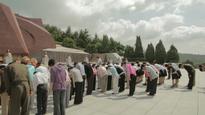
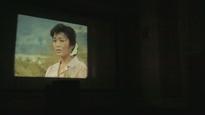
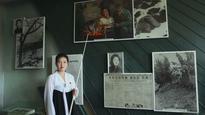
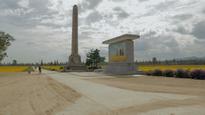
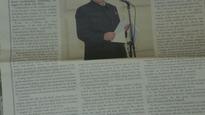
- Format DIGITAL FILE(DIGITAL FILE)
- Color system PAL
- Color col.
- Year 2014
- Duration 00:48:00
- Languageinfo
Running text/titles: French, English UK
Spoken: Korean
-
Artists
-
EVENTS